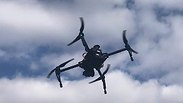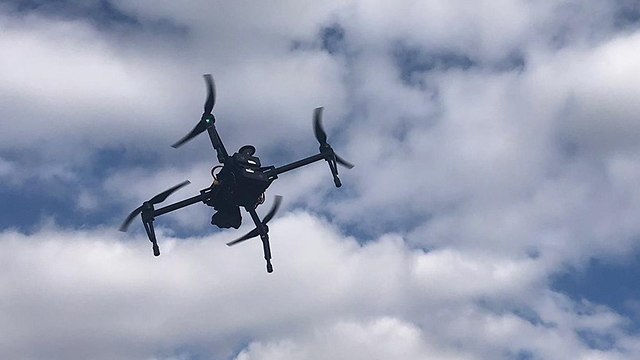
Drones are no longer child's play in Israel
UAV enthusiasts will be obligated to register them with the Civil Aviation Authority as well as successfully undergo a flight-restrictions test; those failing to abide by the new law would be given a hefty fine.
Anyone purchasing a drone in Israel will be obligated to register their UAVs with the Civil Aviation Authority, as well as successfully undergo a flight-restrictions test and submit the aerial vehicle's license number, according to the new regulations the authority is expected to publish in the upcoming weeks.
The test and registration will be conducted on the authority's website for the minimum fee of NIS 30, with those failing to abide by the new law ordered to pay a hefty fine of thousands of shekels.
The police will have access to the IAA's data, enabling them to run inspections on drone owners and ensure they are registered as such.
Those operating drones in their line of work would have to obtain a more advanced license, and undergo a more comprehensive exam for the fee of NIS 300. Professional operators will be able to apply for a license to fly the drones in greater proximity to buildings and crowded spaces.
The existing law, which was enacted in 1981, applies to radio-controlled aircraft, which became a popular hobby 30 years ago. Although the law restricts flying the aircraft up to a maximum height of 150 meters and to maintain a distance of at least 2km from all airports, this is difficult to enforce and is not adapted to the current reality.
Today drones — which are sold in practically every store — have replaced the amateur-operated aircraft. The IAA estimates that there are 15,000-20,000 drones weighing from 250g to 25kg in operation in Israel. Automatic UAVs weighing 250g are sold for hundreds of shekels, and those operating them are not obliged to undergo any special training.
"Most accidents involving UAVs and civil aviation aircraft are caused due to negligence and drone operators' lack of knowledge, rather than due to malicious activity," an IAA official said. "The drones are automatic, and everyone can purchase them lacking the know-how about the risks they entail and existing restrictions."
Meanwhile, a UAV was recorded flying too close to a Black Hawk helicopter over the Palmachim airbase in the central of the country. The base's airspace was not closed off during the incident, however, and the drone operator was not traced.
Last December 2018, London's Gatwick Airport, the country’s second-busiest, was closed for more than 36 hours after drones were spotted flying over an airstrip.
Professionals say that even a drone flown for recreational purposes and not as an instrument of terror, might cause an aircraft crash if it hit certain parts of the jet.
In an attempt to counter the danger posed by drones, the Avnon Group technology company recently launched its SKYLOCK anti-drone system, designed to detect and neutralize UAVs.
According to the 2017 State Comptroller report, the Israeli Air Force is responsible for handling UAVs operated to carry out terror attacks. The report said that the state has yet to regulate the division of responsibility in both the civil and the security spheres.











